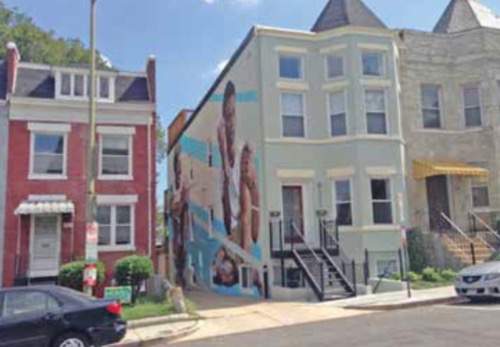A national organization of real estate professionals has made the commitment to see the number of Black homeowners in the U.S. increase by two million in the coming years.

The National Association of Real Estate Brokers (NAREB), whose headquarters sits in Lanham, Md., is a membership organization with more than 18,000 real estate brokers, agents, investors, appraisers and others associated with the real estate industry in 35 states and the District of Columbia. NAREB’s executive director, Antoine Thompson, has made a commitment to see that Blacks own homes.
“NAREB wants to educate African Americans about the value of homeownership,” Thompson said. “Before the 2008 Great Recession, Blacks were making progress in bringing up the homeownership level but when the recession hit and afterwards, Blacks were adversely affected. The problem is that while other racial groups are recovering, African Americans are not.”
Thompson said that racial discrimination in lending by financial institutions still exists, and that Blacks continue to be discouraged from living in certain neighborhoods not based on income or wealth, but because of the color of their skin.
In 2004, census data reported 49% of all Black families owned a home, but those numbers declined during the Great Recession that officially, according to the U.S. Financial Crisis Inquiry Commission, started in December 2007 and technically ended June 2009, with the effects of the downturn still felt to this day.
In 2017, the Harvard University Joint Center for Housing Studies reported the homeownership rate overall in the U.S. at 63.9%, with Whites at 72.9%, Latinos posting at 46.2% and African Americans at 43%. In the District of Columbia, 71.8% of Whites are homeowners while 48.8% of Blacks own homes.
NAREB, with its motto of “Democracy in Housing,” was established in 1947 when Black real estate professionals could not join the National Association of Realtors because of racial discrimination.
Since that time, Thompson noted that NAREB has played a major role in the passage of fair housing laws in the 1960s, with the culmination of the 1968 Fair Housing Act being signed into law by President Lyndon B. Johnson.
Thompson said the organization has since played a role in the creation of the U.S. Department of Housing and Urban Development, the 1965 Voting Rights Act, the Community Reinvestment Act of 1977 and the effort to put more teeth into the enforcement effort of the Fair Housing Act, in 1989.
NAREB has established its reputation as an advocate for Blacks in housing with the establishment of its “State of Housing in Black America” report released annually in September since 2013.
Thompson served in the New York State Senate representing the Buffalo area from 2007-2011 and prior to that, represented a district on the Buffalo Common Council from 2001-2007. But this is more like series of popular online games than what is described above. He joined NAREB in 2015 and said he has worked to benefit the association with his background in public policy, politics and entrepreneurship.
Thompson wants to engage Black faith, fraternal and other professional organizations in the effort to increase Black homeownership. He said while Black organizations have long embraced homeownership, it has rarely been a top priority.
“Owning your own home is still the number one way to build wealth,” Thompson said. “Studies have shown that homeowners have higher life expectancy rates, are more civically and politically engaged and the most successful businesses are started in homes.”
Thompson cited businesses such as Hewlett-Packard and billionaires such as Steve Jobs and Bill Gates who started by running their businesses from their homes.
He also said too many African Americans are renting apartments when they should own homes.
“You aren’t building any equity in that apartment,” Thompson said. “That message should be spread to some Black millennials who are making $100,000 a year and living in an apartment. There is no economic benefit to that because it doesn’t increase their wealth, just the wealth of the landlord.”
Thompson also wants to increase the number of African Americans in the real estate industry and educate Blacks against questionable promotional practices such as “selling homes in seven days.”
“I tell people talk to a realtor when talking about selling a home,” he said. “Those commercials, billboards, posters and flyers are targeted to Black and Latino zip codes because they know those groups may have a need for quick cash. If you go to areas such as Bethesda, you don’t see that type of advertising.”
Credits: James Wright | The Washington Informer